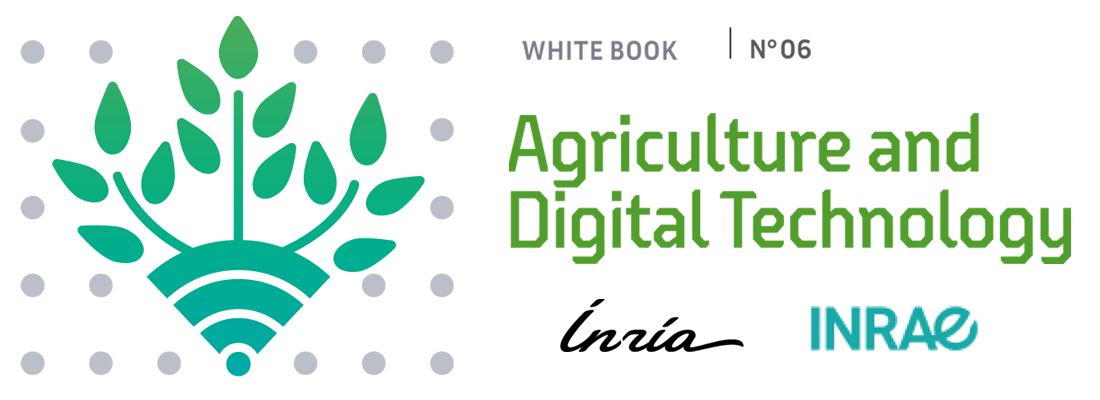Agroecology Reading time 3 min
Agriculture and Digital Technology: a white paper by Inria and INRAE to establish the foundations for responsible digital agriculture
Published on 01 March 2022

Digital leverage for the transformation of farming and food systems
This Agriculture and Digital Technology white paper was jointly conceived by five researchers from INRAE and Inria – institutions that are pivotal to research in agriculture and digital technology. Building on the work of #DigitAg (the Digital Agriculture Convergence Lab, led by INRAE) the paper has been produced with the help of thirty or so specialists from these institutions. It explores how smart farming can act as a lever to assist in the virtuous transition of agriculture and food systems, examining ways to mobilise and implement new capabilities in data acquisition, use of AI in processing, task automation and robotisation, connectivity and virtual exchanges to contribute to the transition to sustainable forms of farming and food systems. Examining the technologies, methodologies, opportunities and risks involved in digital agriculture, Inria and INRAE build up a picture of the scientific and technical challenges that research in France must overcome to enable the development of digital solutions and uses that will facilitate transition for agroecology and food systems, while taking full account of the risks identified.
Smart and responsible technology for responsible farming
This vision can only be achieved by adopting a cross-disciplinary approach, where research tasks are carried out within a wider ecosystem that brings together stakeholders from the worlds of academia, agriculture and food, along with the innovation sector. Indeed, the innovations that will be required must extend beyond the field of technology to organisational and management structures, as their implementation will occur in an environment where the communication methods and operational practices of those involved will themselves have been profoundly altered by the development of digital tools. The responsible research and innovation (RRI) framework requires the participation of stakeholders from the outset in the formulation of projects, and the risks associated with digital technology must likewise be identified for early co-creative consideration. Responses to the identified challenges can then be built firmly on the four public-policy cornerstones of frugality, security, resilience and accessibility. The adoption of digital technologies in agriculture must be guided by their utility, and by the participation of end-users in their development and associated training. Responsible digital agriculture is thus shaped by a dual dynamic of responsibility in both digital technology and the agriculture it supports.
From state of the art to future risks and challenges in 6 chapters
In just six chapters, this white paper aspires to present an ambition – to construct a digital technology that will serve the agroecological transition, help to establish local food systems and restore balance to food supply chains. After introducing the challenges of agricultural transformation, a state-of-the-art review then explores existing and potentially useful digital technologies and methods for agriculture. It sets out the opportunities digital technology can offer to help the agroecological transition along with the pitfalls that must be addressed. It thereby captures the main issues that research must tackle if we are to improve our capacity to understand, master, prepare, equip and support the deployment of digital technology in agriculture and the food chain, paying due attention to the transformations it will bring to these sectors and their ecosystems. If it is to contribute to the transition to sustainable forms of agriculture and food systems, the deployment of digital technology demands a systemic vision able to identify impacts that concern the economy as much as they do the environment and social structures, and that extend throughout the entire life cycles of the proposed tools and methods, so that we can be confident that the benefits are genuine.
